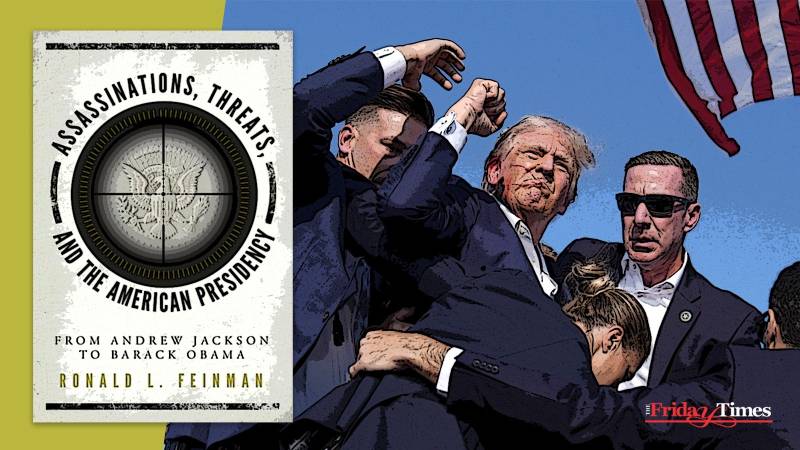
On Saturday, July 13, 2024, during an election rally in Butler, Pennsylvania, former President Donald Trump narrowly escaped an assassination attempt. The assailant, identified as 20-year-old Thomas Matthew Crooks, took to a rooftop and opened fire, with one bullet grazing Trump's right ear. The Secret Service agents acted quickly, forming a protective circle around the former President and whisking him off the stage to safety.
To gain a historical perspective on threats against American presidents and understand the broader implications of this incident, I spoke to Dr. Ronald Feinman, a distinguished Professor of American History, Government, and Politics with nearly five decades of teaching experience, whose book "Assassinations, Threats, and the American Presidency: From Andrew Jackson to Barack Obama" examines the long-standing history of presidential threats dating back to the first known threat against Andrew Jackson in 1833.
Below is our full conversation.
Zahoor Raza (ZR): In your book 'Assassinations, Threats, and the American Presidency: From Andrew Jackson to Barack Obama,' you extensively cover the assassinations of American political leaders. How would you compare the attempted assassination of Donald Trump to previous attacks on US presidents, and what parallels can be drawn between this event and other historical assassination attempts on American presidents?
Dr Ronald Feinman (RF): The attempted assassination of Donald Trump, thankfully, turned out to be far less serious, fortunately. All of the attempted assassinations were due to political controversy, but also over the mental instability of the assassins.
Much more serious were the four Presidents killed—Lincoln, Garfield, McKinley, Kennedy -- but also the murders of two Presidential contenders, Huey Long and Robert Kennedy. The wounding of Theodore Roosevelt and Donald Trump occurred when they were no longer President, and George Wallace was a Presidential contender, who was seriously wounded in his third campaign for President. Reagan had a miraculous recovery, but it seemed later that it had likely spurred the development of Alzheimer’s, which started to show up in his second term, but was finally announced five years after leaving the Presidency.
ZR: How do comparisons like likening Trump to Hitler and recent statements such as Biden's 'bullseye' comment impact American political discourse today? Are there identifiable patterns or correlations between heightened rhetorical language and increased security risks for political figures?
RF: The use of unfortunate language in political discourse has a deleterious effect on political figures, worsening their security risks, and hopefully, can be toned down.
ZR: Trump's defiant response to the incident has bolstered his image as a resilient leader and garnered sympathy from voters. How might this incident become a central part of his campaign narrative and influence his messaging and appeal to voters?
RF: Trump's short-term reaction is a good sign of promoting unity, but we will have to wait and see his acceptance speech on Thursday, and the selection of JD Vance tends to make one have doubts that the campaign will tone down its confrontational attitude, which has been part of the Trump brand.
ZR: The Secret Service has come under heavy criticism following the incident. Do you think the Secret Service adequately performed its protective duties, and how might this incident impact future rallies?
RF: The Secret Service is in crisis, as it has been clear that it has not been on the high-quality level that it used to be, with problems of recruitment and training, and a lot of turnover. There will need to be a major overhaul and reform of the training and monitoring of the organization. There will be much more attention paid to the essential need for better protection in future rallies.
ZR: The political landscape in terms of increasing polarization and division between different political groups has drastically changed since the last presidential assassination attempt. In what ways does this assassination attempt mirror the current climate of extremism and violence in American politics?
RF: The increasing polarization and division in American politics is likely to increase due to this Trump assassination attempt, and it is very worrisome for the safety of the political leaders of both sides, not only the Presidency, but also for members of Congress, state government, and local government.

